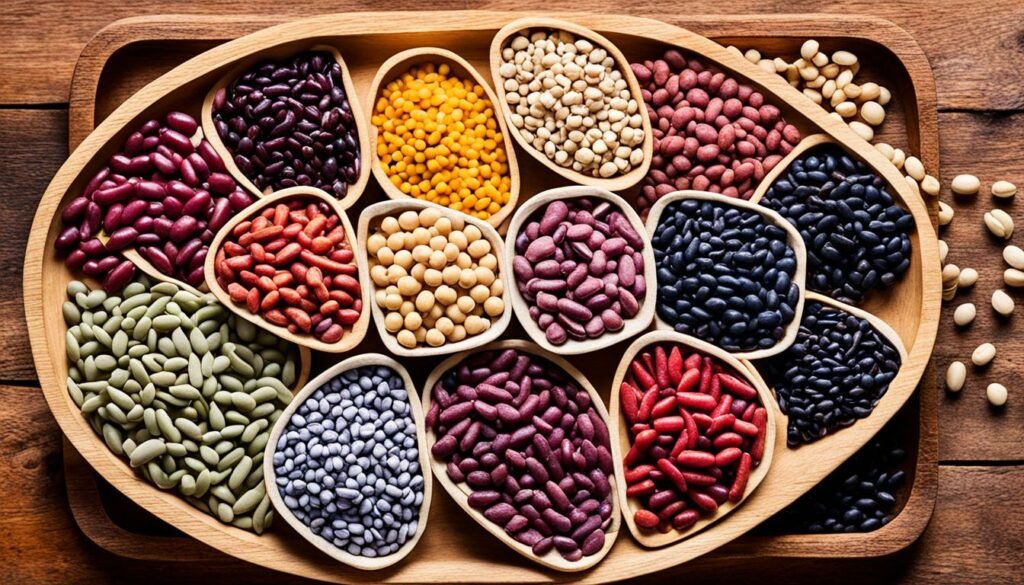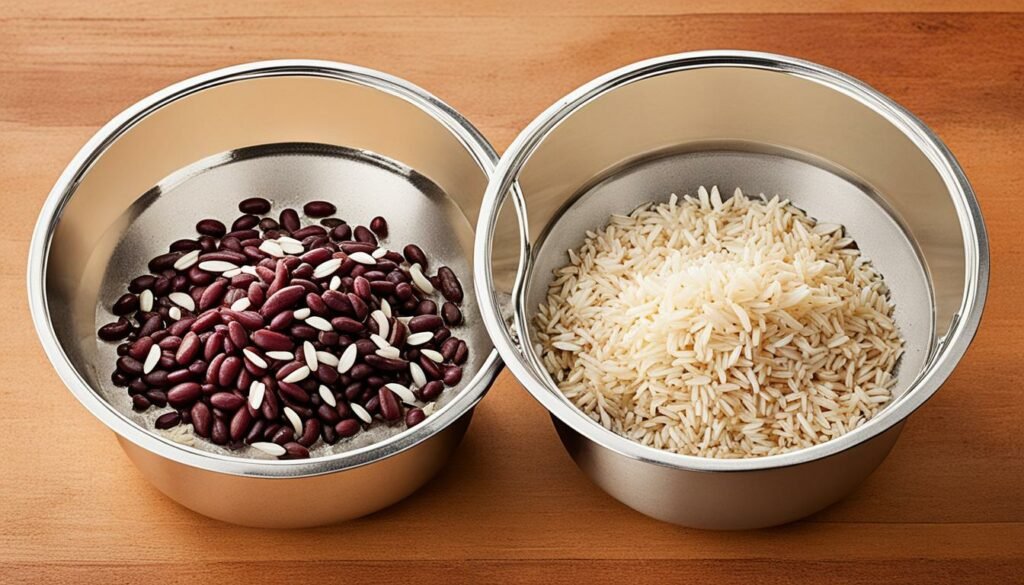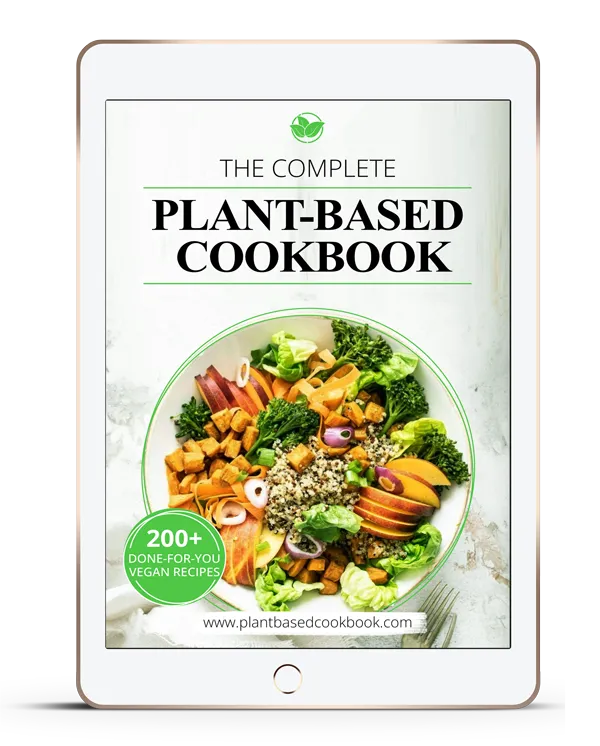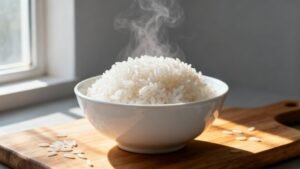Ever pondered how to elevate simple pantry items into a delectable meal that’s both nutritious and fulfilling? I’m here to unveil my foolproof technique for cooking rice and beans, ensuring every bite is a delight.
Rice and beans represent the epitome of comfort food. This timeless duo has been a staple for countless generations, providing a filling and nutritious meal that’s budget-friendly. It’s a skill that benefits both seasoned cooks and novices alike, making it essential to master.
This guide will guide you through the process of crafting a scrumptious rice and beans dish in 30 minutes. With a handful of straightforward ingredients and actionable advice, you’ll soon be preparing this comforting meal effortlessly. Let’s embark on this journey and uncover how to transform these pantry essentials into a memorable feast.
Table of Contents
ToggleIntroduction to Rice and Beans: A Classic Combination
Rice and beans are a timeless duo, cherished across cultures. This simple yet satisfying meal is a cornerstone of many cuisines, especially in Latin American dishes. Let’s delve into why this pairing has endured and continues to delight people globally.
Cultural Significance of Rice and Beans
In Latin cuisine, rice and beans are more than food; they’re cultural icons. From Cuban arroz con frijoles to Brazilian feijoada, these dishes narrate stories of heritage and tradition. Their origins are rooted in necessity, providing affordable sustenance for generations.
Nutritional Benefits of this Staple Dish
As a nutritionist, I’m struck by the health benefits of rice and bean recipes. They’re loaded with plant-based proteins, making them perfect for vegetarians and vegans. A typical serving delivers a balanced mix of carbohydrates, fiber, and essential nutrients.
| Nutrient | Amount per Serving |
|---|---|
| Calories | 140 |
| Carbohydrates | 27g |
| Protein | 6g |
| Fiber | 6g |
Versatility in Cuisines Around the World
The versatility of rice and beans is remarkable. In Latin cuisine, they’re often seasoned with cumin and garlic. Nigerian dishes might incorporate palm oil and peppers. I’ve encountered variations from the Caribbean to the Mediterranean, each with its unique spin on this classic duo.
Rice and beans, whether as a main course or side dish, prove that simple ingredients can craft extraordinary meals. Their global acclaim underscores their taste, nutrition, and cultural importance.
Choosing the Right Ingredients for Your Rice and Beans
Selecting the right ingredients is crucial for making delicious, budget-friendly rice and beans. I’ll walk you through the essential components for a perfect dish.
Types of Rice
I always opt for long-grain white rice for its fluffy texture and excellent separation when cooked. Brown rice, while healthier, takes longer to cook. Jasmine rice brings a fragrant aroma, while basmati rice adds a nutty taste. Each type demands specific preparation techniques for the best outcome.
Bean Varieties
Black beans are my top choice for their rich flavor and nutritional value. Kidney beans provide a hearty texture, and pinto beans a creamy consistency. For a Nigerian flair, consider black-eyed peas or honey beans. While canned beans are quick, dried beans are more economical for budget-friendly meals.

Essential Seasonings and Aromatics
Onions are vital for flavor. I always add salt to boost taste and butter or oil for richness. Water can replace stock in many recipes for everyday cooking. Feel free to experiment with garlic, bay leaves, or cumin to make your rice and beans unique.
| Ingredient | Function | Cooking Tip |
|---|---|---|
| Long-grain rice | Base of dish | Rinse before cooking |
| Black beans | Protein source | Soak overnight if using dried |
| Onions | Flavor enhancer | Sauté until translucent |
| Salt | Seasoning | Add gradually to taste |
Preparation Techniques for Perfect Rice and Beans

I find solace in crafting easy rice dishes, especially rice and beans. These dishes are my comfort food. The secret to achieving perfection in rice and beans is in the preparation. Let’s explore some techniques that will take your dish to the next level.
Begin by inspecting your beans for stones or debris. Rinse them until the water remains clear. For rice, ensure it’s rinsed well to eliminate excess starch, resulting in fluffy grains.
Soaking beans significantly reduces cooking time and aids digestion. I prefer soaking mine overnight or using a quick-soak method. This involves boiling them for a minute, followed by an hour of soaking.
When cooking beans, simmer them gently until they’re tender but not mushy. This process typically takes 40-45 minutes. For rice, it’s crucial to use the correct water-to-rice ratio and cook it covered on low heat.
| Bean Type | Soaking Time | Cooking Time |
|---|---|---|
| Black Beans | 8 hours | 45-60 minutes |
| Kidney Beans | 6-8 hours | 60-90 minutes |
| Pinto Beans | 6-8 hours | 90-120 minutes |
For organic beans, I retain the cooking water as it’s rich in nutrients. However, for non-organic beans, I drain and rinse halfway through cooking to minimize residues.
These preparation techniques will ensure your rice and bean recipes turn out delicious every time. With practice, you’ll soon become adept at preparing these easy rice dishes effortlessly.
How to Cook Rice and Beans: Step-by-Step Guide
Cooking rice and beans is a delightful process that yields a nutritious meal. It’s essential to follow a step-by-step guide to achieve perfect results. Let me guide you through the process of cooking rice and beans to perfection.
Cooking Beans from Scratch
Bean cooking begins with soaking. I soak my beans overnight to cut down the cooking time. After draining, I place them in a pot with fresh water and simmer for about 40 minutes. The goal is to cook them until they’re almost tender but still slightly firm.
Preparing the Rice
For rice preparation, I thoroughly rinse the grains. This step removes excess starch, preventing clumping. I use a 2:1 ratio of water to rice for the best results.
Combining Rice and Beans for Optimal Flavor
Now, let’s combine the rice and beans. I add the rinsed rice to the partially cooked beans. A bit of butter or oil enhances the flavor. Seasoning with salt and letting it simmer for about 20 minutes ensures the flavors blend well.
For a twist, try the Nigerian method. Cook the beans first, then add rice and cook together. Alternatively, opt for a Latin American approach: sauté onions and garlic, add cumin and rice, then pour in broth and beans. Bring to a boil, then simmer until the rice is tender.
Remember, practice is key when learning how to cook rice and beans. Don’t hesitate to experiment with different seasonings and methods to discover your favorite combination!
Time-Saving Tips for Quick and Easy Rice and Beans
I adore easy rice dishes that serve as pantry staples and budget-friendly meals. Rice and beans are ideal for this, offering quick and simple cooking solutions. Here, I share some tips to expedite and simplify their preparation.
Using Canned Beans Effectively
Canned beans are a game-changer for rapid meal preparation. I thoroughly rinse them to diminish sodium content and enhance flavor. This step ensures they’re ready for incorporation into easy rice dishes swiftly, ideal for when time is of the essence.
Pre-Soaking Beans for Faster Cooking
For dry beans, pre-soaking overnight significantly reduces cooking time. This straightforward step is crucial for preparing budget-friendly meals with beans efficiently.
Meal Prep Strategies for Busy Weeknights
Meal prepping rice and beans is a staple for me. I prepare a substantial quantity on weekends and divide it into portions for the upcoming week. This approach transforms these staples into swift, effortless meals for hectic evenings. Leftovers are stored in airtight containers within the fridge or freezer. Upon reheating, a dash of water is added to maintain the dish’s moisture.
- Cook rice in bulk and freeze in portions
- Prepare a variety of bean types for the week
- Mix and match beans with different rice types for variety
These strategies have cemented rice and beans as staples in my culinary repertoire. They’re not merely pantry items; they’re the cornerstone of numerous easy, budget-friendly meals.
Flavor Variations and Regional Recipes
I find the exploration of rice and bean recipes across cultures fascinating. Latin cuisine is particularly rich in delicious variations. Let’s delve into some regional specialties that highlight the versatility of this classic combination.
In Puerto Rico, Arroz Junto is a beloved dish. It combines rice, beans, and meat in one pot. The secret ingredient is sofrito, a mix of aromatic herbs and spices crucial to many Latin dishes.
Jamaican rice and peas is another well-loved dish. Although named as such, it actually contains kidney beans. Coconut milk brings a creamy texture and subtle sweetness, making it a Caribbean staple.
For a West African twist, try Ghanaian Waakye. This dish features rice and black-eyed peas cooked with dried millet leaves. This gives it a unique flavor and color.
| Country | Dish | Key Ingredients |
|---|---|---|
| Puerto Rico | Arroz Junto | Rice, beans, meat, sofrito |
| Jamaica | Rice and Peas | Rice, kidney beans, coconut milk |
| Ghana | Waakye | Rice, black-eyed peas, millet leaves |
To boost the flavor of your rice and beans, try adding spices like cumin and cayenne pepper. A squeeze of lime juice and a sprinkle of fresh cilantro can brighten any Latin-inspired dish.
Serving Suggestions and Complementary Dishes
Rice and beans are a classic duo, but they can be elevated with the right pairings. I enjoy exploring various ways to serve this nutritious meal. Let’s explore some tasty options that’ll make your rice and beans stand out!
Pairing Rice and Beans with Proteins
To create a balanced meal, I often add protein to my rice and beans. Grilled chicken, baked fish, or slow-cooked beef are excellent choices. For plant-based options, I include tofu or tempeh. These additions enhance the flavor and make the dish more satisfying.
Side Dishes that Enhance the Meal
Side dishes can elevate your rice and beans to new heights. I prefer crispy fried plantains or a fresh green salad. Roasted veggies like bell peppers and zucchini add color and nutrients. For a comforting touch, I sometimes serve a hearty stew alongside my rice and beans. This combination is ideal for chilly evenings.
Garnishes and Toppings for Extra Flair
I love adding garnishes for that extra flair. A sprinkle of fresh cilantro or parsley brightens the dish. For some heat, I add sliced jalapeños or a dash of hot sauce. A dollop of sour cream or a squeeze of lime juice can add a tangy twist. These simple additions enhance the flavors and make each bite exciting.
FAQ
What are the key ingredients needed to make rice and beans?
Essential ingredients for rice and beans include olive oil, onion, garlic, white rice, vegetable broth, black beans, cumin, and cayenne pepper.
How long does it take to prepare rice and beans?
Rice and beans preparation takes about 30 minutes. This includes 5 minutes for prep and 25 minutes for cooking.
What types of rice can be used for this dish?
Long-grain white rice is best, but you can also use brown rice, jasmine, or basmati rice. Adjust cooking times as needed.
Can I use different types of beans besides black beans?
Yes, you can use various beans like black-eyed peas, honey beans, kidney beans, or pinto beans for this dish.
What are some tips for reducing gas-producing properties of beans?
Soaking beans before cooking can reduce gas-producing properties. Rinsing and draining beans during cooking also helps, especially for non-organic beans.
How can I save time when preparing rice and beans?
Use canned beans instead of dried beans to save time. Or, pre-soak dried beans overnight to cut down on cooking time.
How can I enhance the flavor of rice and beans?
Enhance flavor by adding spices like cumin and cayenne pepper. Use coconut oil or peanut oil for taste. Garnish with fresh cilantro, parsley, lime juice, or jalapeños.
What are some complementary dishes to serve with rice and beans?
Rice and beans go well with proteins like chicken, fish, or beef. They also pair with stews, soups, or sauces like Nigerian stew, chicken peanut soup, or creamy coconut sauce. Side dishes can include fresh salads, fried plantains, or roasted vegetables.






